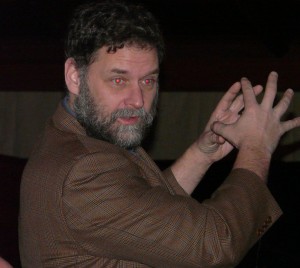On the Martin Luther King Holiday, I think it is only right to think about ageism, which, along with racism and sexism, is a fundamental barrier to achieving the more just and equitable society that we desire.  Coincidentally, over the weekend, I had an opportunity to hear from Bill Thomas, MD, the developer of the Eden Alternative and The Greenhouse model of long-term care. (And author of the Changing Aging Blog featured on our blog roll.)
Coincidentally, over the weekend, I had an opportunity to hear from Bill Thomas, MD, the developer of the Eden Alternative and The Greenhouse model of long-term care. (And author of the Changing Aging Blog featured on our blog roll.)
Dr. Thomas had come to address our leadership retreat of directors of academic geriatric programs, where each year we bring someone who has shown unusual leadership in aging to stimulate attendees to think about their own unique contributions (in the terms of our recent annual report--to think about how they will "answer the call to leadership"). As a provocative speaker he did not disappoint.
He argued that our society is suffering from malignant, metastatic adulthood. He posited that both children and older adults are inappropriately pressured to conform to the highly agentic, doing-oriented model of adulthood valued by our society, rather than the more "being-oriented" state truly appropriate for their life stages. He argued that older adults find themselves valued (and value themselves) to the extent that they "STILL" can do all the things of earlier adulthood--leading to the ludicrously one-sided portrayals of older people busier than ever barefoot water-skiing and globetrotting--and foreclosing the existence of an authentic "elderhood." 
He argued that we, midlife, doing-oriented adults, are positively dangerous without the counterbalance of elders who have outgrown adulthood and are firmly in a more reflective elderhood stage of "being."
Regardless of how dangerous I really am, there is much about this argument that makes sense to me. Just last week, there was discussion on the GeriPal blog of the meaning of our societal unwillingness to face the possibility of dependence in late life. Ken Covinsky's post was stimulated in part by a New York Times New Old Age blog post about how some older adults are more comfortable planning for their deaths than they are planning for any period of dependency before death. We all agreed that there were just no good cultural models for how a person can be worthwhile if not an independent, fully-functioning (read agentic) adult. The notion of the elder as another stage of life entirely where one's value is determined not by the brutal "doing" of adulthood but rather by being - sage, wise, and temperate - having learned from the success and failures of struggle is very attractive.
Part of the attraction for me is that I was just visiting my mid-70s parents in California after they visited us in New York over the holidays. For my mother in particular, her arthritis and macular degeneration is a constant source of frustration. Around meals and various holiday activities she often asked, "What can I do to help?" and it was hard on her and all of us when we couldn't really think of anything. In this alternative concept of elderhood, we would all be more appreciative of the contribution she makes by being--by bringing to bear the wisdom of her experience--rather than accomplishing more tasks.
I think we may have discovered one of the limits even of our favored term for old people: "older adults." Maybe by trying to emphasize the continuity of older people to earlier stages of life, we are undermining the emergence of the necessary next stage--elderhood?
